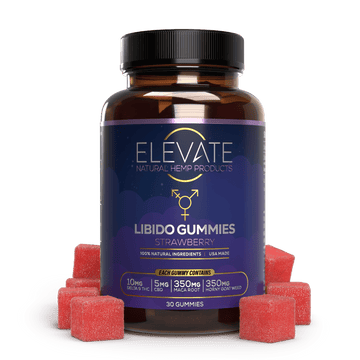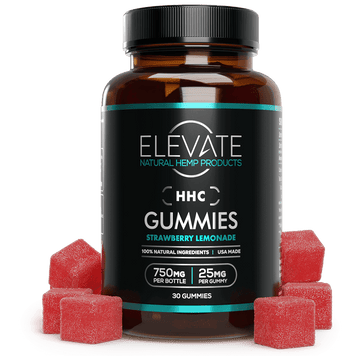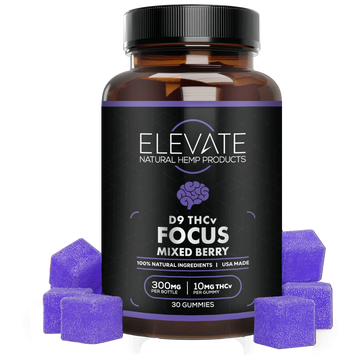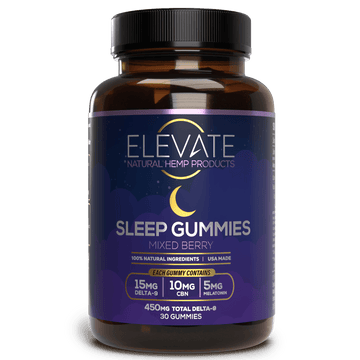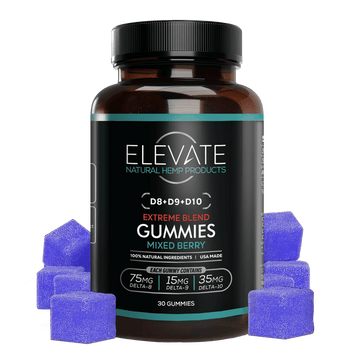HHC vs. THCP: Which Is More Potent?

HHC vs THCP Potency:
THCP is significantly more potent than HHC. THCP binds 33x stronger to CB1 receptors than Delta 9, while HHC is roughly similar to Delta 9 in potency. Use 1-3mg THCP vs 10-25mg HHC. THCP requires extreme caution with dosing.
Table of Contents
- So, What Exactly Is HHC?
- What's the Deal with THCP?
- HHC vs. THCP: What's the Difference?
- Are HHC and THCP Legal?
- User Reviews: What People Are Saying
- A Note on HHCP: The Even Stronger Cannabinoid
- Consumer Safety: What to Know Before You Buy
- Which One Is Right for You: HHC or THCP?
- FAQs
- Making Your Final Choice
- Key Takeaways
- Related Articles
The science behind cannabinoids is fascinating, and it directly impacts your experience. Take HHC and THCP, for example. HHC is created by adding hydrogen to THC, a process that makes it incredibly stable with a long shelf life, resulting in a reliable product. THCP is a naturally occurring but very rare compound with a unique molecular structure that makes it bind to your body's receptors with incredible strength. This chemical difference is why when you compare HHC, THCP, and how potent they are, you find such a massive gap. Let's explore how their origins define their very different effects.
As the universe of cannabinoids continues to grow, two compounds that have stirred up attention lately are HHC (Hexahydrocannabinol) and THCP (Tetrahydrocannabiphorol). HHC and THCP are cannabinoids that you have likely heard about, all while the majority know THC or CBD, HHC & THCP will enable a completely new world for us to explore.
Even if you are an amateur who is foraying into the world of cannabis, it pays to know how HHC and THCP are different. In this article, we show you a detailed comparison between these two chemicals so that you can decide and choose from them as per your priority and requirements.
So, What Exactly Is HHC?
HHC (hexahydrocannabinol) is a young cannabinoid. It is chemically a hydrogenated version of THC. CBD has the same base structure as THC, but with some hydrogen atoms tacked on. An HHC molecule changes the chemical structure of THC, with a resulting impact on how it behaves in your body.
How Is HHC Made?
Since HHC is not naturally occurring in marijuana plants, it usually gets synthesized. This is a chemical process much like how vegetable oil becomes margarine — hydrogenating THC to make HHC. With these hydrogen atoms added to THC, HHC is a more stable compound than most other cannabinoids and will last longer on the shelf.
The Hydrogenation Process
So, how does THC transform into HHC? It all comes down to a process called hydrogenation. If that sounds familiar, it’s the same technique used to turn vegetable oil into margarine. In this case, scientists take hemp-derived cannabinoids and add hydrogen atoms to them under pressure. This addition changes the molecular structure, turning THC into HHC. This chemical tweak is what gives HHC its unique properties, particularly its impressive stability. It’s a fascinating bit of chemistry that creates a compound ready for reliable and consistent products, like our HHC gummies, which are designed to deliver a predictable experience every time.
Why HHC is More Stable Than THC
The main advantage of hydrogenation is that it makes HHC much more stable than its cousin, THC. Over time, THC naturally breaks down and converts into another cannabinoid called CBN, especially when exposed to heat or sunlight. This means THC products can lose their potency. HHC, on the other hand, is built to last. Its hydrogenated structure makes it resistant to degradation, giving it a significantly longer shelf life. This stability ensures that the product you buy today will maintain its quality and effects for longer, a standard we uphold across all our products. Many people also find that HHC offers a more relaxing experience than traditional Delta-9 THC, often with less of the anxiety or paranoia that can sometimes accompany a high.
HHC's Effects: What to Expect
One of the defining top qualities of HHC is its psychoactive impacts, which are like those triggered by THC yet typically considered to be weak. Consumers commonly rate the HHC high experience as less potent and more chill than THC. This is what makes HHC such a popular choice among people seeking the effects of THC but who want to avoid an overwhelming head high. HHC is also said to give some users a cerebral high and others all of the benefits of THC without many risks like anxiety or paranoia.
Popular Ways to Use HHC
Commonly, much like other cannabinoids out there, you can find HHC in several different forms. HHC appears in vape cartridges, edibles, tinctures, and even topicals. Among the many methods of consumption, vaping and edibles are highly popular due to their convenience and rapid effects. Since HHC is not as strong as THC, it can be used for mild occasions where just a light high will do, for example, during social events or when you need to stay functional throughout the day.
What's the Deal with THCP?
Another recently discovered cannabinoid that has garnered public interest is THCP, or Tetrahydrocannabiphorol. Although THCP is a naturally occurring cannabinoid, it was discovered only in 2019 by an Italian research team. THCP now stands for tetrahydrocannabiphorol, and it is a unique molecule that has opened new frontiers in the study of cannabinoids, as shown by its peculiar characteristics.
The Discovery of THCP
This aspect makes the cannabinoid THC’s personal chemical structure peculiar distinctly from other cannabinoids. This minor difference in configuration has a major effect on the way THCP interacts with the body. THCP appears to bind more tightly with the CB1 receptors in the brain – which are largely responsible for mediating cellular effects of cannabinoids and famously modulating their beautiful, psychoactive qualities.
Natural Rarity vs. Lab Synthesis
One of the biggest distinctions between HHC and THCP lies in how they come to be. HHC is typically created in a lab through a process called hydrogenation. It’s similar to how vegetable oil is turned into margarine—scientists add hydrogen atoms to a THC molecule to alter its structure. This process doesn't just create a new cannabinoid; it also results in a more stable compound. This stability is a key advantage, giving products like HHC gummies a longer shelf life. In contrast, THCP is a naturally occurring cannabinoid, but it's incredibly rare. It was only discovered by researchers in 2019, found in cannabis plants in very tiny amounts. Because it's so scarce, extracting a significant quantity of THCP directly from the plant isn't practical. This natural rarity versus lab synthesis directly impacts the availability and consistency of these two cannabinoids.
THCP's Effects: Is It Really That Potent?
THCP is widely considered to be incredibly potent, with some references suggesting it could be 30 times more powerful than standard THC. This increased activity suggests that THCP could be very psychoactive, even at low doses. Many users describe it as a very strong high that is uplifting and can last for hours. The potency of THCP means that it is recommended for experienced cannabis consumers who will recognize the effects of this strong cannabinoid. It can be overwhelming to those who might be prone to the same effect using THC, or overly sensitive people who try THCP for the first time, so do it with caution.
Common Ways to Consume THCP

Like HHC, THCP comes in the following forms: vape cartridges, tinctures, and edibles. This means that it is important to be cautious with dosing of THCP because of its potential potency. Since even lower doses can be significant, it is a good idea to start on the very low side if you are new. A popular method of consumption used with THCP is through vaping, which helps users to manage their intake and effects over time.
It’s a more sociable, smokeless high and avoids smelly inhalation, followed by the lighter-and-edibles one-two punch that is also popular but takes longer to kick in (which can lead unsophisticated users to consume too much).
HHC vs. THCP: What's the Difference?
While both HHC and THCP are potent cannabinoids derived from cannabis plants, their effects, potency, and overall characteristics differ significantly. Understanding these key differences can help you decide which particular cannabinoid is better suited to your needs, whether you’re seeking a mild, relaxing experience or a powerful, intense high.
A Look at Their Chemical Structures
At the molecular level, HHC (Hexahydrocannabinol) and THCP (Tetrahydrocannabiphorol) are quite distinct, despite both being derived from cannabis plants. HHC is a hydrogenated form of traditional THC, meaning it has the same base molecular structure but with added hydrogen atoms. This slight modification results in a more stable compound with a longer shelf life.
THCP is different, though, as it has a longer alkyl side chain, meaning that it binds more effectively to the endocannabinoid receptors in the body, and more specifically the CB1 receptors that cause psychoactive effects.
Comparing the High: HHC vs. THCP
HHC and THCP possess very different psychoactive qualities. HHC is less potent than regular THC, so the high is not as intense and is more manageable. Users describe HHC's effects as calming and mentally clear, which makes it an excellent option for people who wish to experience the effects of THC without a super intense high. In contrast, THCP is said to be extremely psychoactive, with effects 30 times more potent than regular THC. THCP produces a heavy high that is too intense for some consumers and is therefore more suitable for experienced consumers accustomed to powerful cannabinoids.
The HHC Experience: A Calming, Indica-Like Feeling
Think of HHC as THC’s more laid-back cousin. The experience is often described as a gentle, calming high that feels similar to a classic indica strain, but without the heavy couch-lock. Many people appreciate HHC because it offers a clear-headed sense of relaxation and euphoria, making it a great option for social settings or creative projects. If you've ever felt that THC can sometimes lead to anxiety or paranoia, HHC might be a better fit. It provides many of the same benefits—like mood improvement and physical ease—while generally being less intense. This makes products like HHC gummies a popular choice for those seeking a functional, chill experience that helps them unwind without feeling overwhelmed.
The THCP Experience: An Energizing, Sativa-Like Feeling
On the opposite end of the spectrum is THCP, a cannabinoid known for its remarkable potency. The experience is often compared to a powerful sativa, delivering an intense, uplifting, and long-lasting cerebral high. Because it binds so effectively to your body's cannabinoid receptors, its effects can be significantly stronger than traditional THC. This isn't the cannabinoid for a casual Tuesday afternoon; it's better suited for seasoned users who are comfortable with very strong effects. The high can be quite energizing and may last for several hours, so it’s important to start with a very small dose and give it plenty of time to kick in. For those looking to explore the upper limits of cannabinoid potency, you can shop all our products to find a strength that works for you.
Which One Is More Potent?
When potency is factored, THCP has no doubt but to lead. Due to its unique chemical make-up, it can bind tighter to cannabinoid receptors in the endocannabinoid system and thus creates an incredibly stronger effect. Even slight amounts of THCP can trigger spectacular psychoactive effects, and thus it's usually recommended to take very low doses. HHC, while being psychoactive, is significantly less potent and is typically characterized as being as strong as THC but with a varying effect.
Potency Compared to Delta-9 THC
When you place HHC and THCP next to the well-known Delta-9 THC, you see some major differences in strength. Think of HHC as the more laid-back relative in the cannabinoid family. It’s generally considered less potent than Delta-9 THC, offering a milder, more relaxing experience. This makes it a popular choice for anyone looking for the pleasant effects of THC without a potentially overwhelming high. As one source notes, HHC provides a gentler high that people often describe as more relaxing, with less risk of feeling anxious. This quality makes products like HHC gummies an excellent option for social settings or unwinding after a long day.
On the complete opposite end of the spectrum is THCP. This cannabinoid is known for its incredible strength, with some research suggesting it could be up to 30 times more powerful than standard Delta-9 THC. Because of this intense potency, even a very small dose can lead to significant psychoactive effects. THCP is best suited for experienced cannabis users who are comfortable with strong cannabinoids and are looking for a profound experience. While HHC offers a manageable and calming vibe, THCP provides a powerful alternative, showcasing the incredible diversity available for consumers to explore.
How Long Do the Effects Last?
The action duration and time to action also vary in THCP and HHC. HHC will take effect in minutes when smoked or vaped, with the high lasting for a couple of hours. The action is slow and gradual, and one can slowly step into the experience. THCP, on the other hand, is slow to be felt, especially if ingested, but when it takes hold, the effect is heavy and long-lasting for a couple of hours. The heaviness and duration of effect make THCP perfect for those who like to feel something for longer periods, especially if one wants to act on the endocannabinoid system.
HHC Duration: Up to 12 Hours
The duration of HHC's effects is a major draw for many people. It tends to offer a slow-building, happy high that gradually settles into a smooth, calm feeling that can carry you through a good portion of your day. This experience is quite long-lasting, with some reports indicating effects that can extend for up to 12 hours. This makes HHC a great choice if you're looking for sustained relief or a mellow mood for a relaxed weekend or a creative afternoon. Because the effects are manageable and prolonged, products like HHC gummies are a fantastic option, providing a predictable dose for a functional experience that won't derail your plans.
THCP Duration: 12 to 24 Hours
When it comes to longevity, THCP is in a league of its own. Its effects can last an incredibly long time, typically ranging from 12 to 24 hours, which is significantly longer than traditional THC. Users often describe the experience as a very strong, uplifting high that persists for hours on end. Because of this extended duration, it's crucial to plan accordingly and clear your schedule for the next day. This cannabinoid is best suited for experienced users who are prepared for a powerful and prolonged journey. If you're considering THCP, start with a very small dose and be mindful of its long-lasting nature as you find the right product for your tolerance level.
Potential Therapeutic Uses
Both THCP and HHC come with potential therapeutic benefits, but they are used for different purposes. The soothing effects of HHC are suitable for individuals who need to feel relaxation from stress, mild pain, or anxiety without a strong psychoactive impact. It is also said to be anti-inflammatory. THCP, due to its potency, may be beneficial for more severe ailments, such as chronic pain or insomnia, but its potent effects make it a drug to be used cautiously, particularly in therapeutic applications. The employment of chemical solvents during the synthesis of these cannabinoids can also influence their therapeutic value and safety.
Are HHC and THCP Legal?

The legal status of HHC and THCP varies widely across the globe. In the United States, HHC is in a position of legal limbo—while not expressly forbidden, its synthetic nature makes it an issue under federal analog statutes. THCP, being a natural-occurring cannabinoid, will usually be treated the same as THC, in that it may be banned or illegal where THC is regulated. As both HHC and THCP are among the strongest cannabinoids, it is necessary for users to be aware of the law.
Federal Legality and the Farm Bill
The legal status of cannabinoids like HHC and THCP is a bit of a maze, and it all starts with the 2018 Farm Bill. This federal law made hemp and its derivatives legal, provided they contain less than 0.3% Delta-9 THC. This opened the door for many cannabinoids to be sold across the country. However, the situation is far from settled. Lawmakers are currently working on the next Farm Bill, and there's a lot of talk about closing what some refer to as the "hemp loophole." This means future regulations could significantly change the rules for these products. It's a dynamic situation, so staying informed about federal updates is key for anyone interested in these compounds.
State-Specific Regulations and Bans
Here's the most important takeaway: just because a product is federally compliant doesn't mean it's legal where you live. State governments have the final say, and many have passed their own laws that are much stricter than the federal guidelines. Some states have outright banned or heavily restricted the sale of hemp-derived cannabinoids like HHC and THCP. Because these laws can be very specific and are constantly being updated, it's crucial to do your homework. Before you purchase any HHC or THCP products, you absolutely must check your current state and local regulations. A quick online search for your state's hemp laws is the best way to make sure you're staying on the right side of the law.
User Reviews: What People Are Saying
Consumer preference of HHC vs. THCP depends mostly on individual tolerance and desired effect. HHC is preferred by people who prefer a gentle, manageable high that won't disrupt activity during the day. It's more attractive to a broad set of consumers who are new to cannabis or don't want strong THC effects.
THCP, however, is appealing to seasoned users who are looking for a strong, long-lasting high. The strength of it makes it not quite as accessible to the average user but highly sought after by users looking for something more. Consumer reviews talk to the feeling of being clear-headed with HHC compared to the strong, in most instances overpowering, feeling of THCP, the latter of which is left for night or medical use.
A Note on HHCP: The Even Stronger Cannabinoid
Just when you think you’re getting a handle on the cannabinoid family tree, a new cousin shows up. Meet HHCP (Hexahydrocannabiphorol). If THCP is the powerhouse, HHCP is the next level up. While research is still in its early stages, some evidence suggests that HHCP could be significantly more potent than both HHC and THCP. Its molecular structure allows it to bind with your body's cannabinoid receptors with incredible efficiency, potentially leading to a much more intense and long-lasting experience. Because of its extreme potency, HHCP is best left to very experienced cannabis users who have a high tolerance and a deep understanding of how powerful cannabinoids affect them. For most people, exploring options like HHC or even traditional THC is a much more practical and enjoyable starting point.
Consumer Safety: What to Know Before You Buy
With so many new and exciting cannabinoids hitting the market, it’s easy to get caught up in the hype. However, this rapidly growing industry isn't fully regulated, which means the responsibility to stay safe falls squarely on you, the consumer. The most important step you can take is to purchase products only from reputable brands that prioritize transparency and safety. Trustworthy companies are committed to quality control and are open about their manufacturing processes. They understand that building trust with customers means proving their products are clean, potent, and accurately labeled. This commitment is what separates a reliable brand from a questionable one, ensuring you have a positive and safe experience every time.
The best way for a brand to demonstrate its commitment to safety is through third-party lab testing. This process involves sending a sample of each product batch to an independent laboratory for a full analysis. The lab then provides a detailed report called a Certificate of Analysis, or COA. This document is your proof that the product contains what the label says it does and, just as importantly, what it doesn’t. Any brand worth your money, like Elevate, will make these lab reports easily accessible on their website for all their products, from HHC gummies to CBD oils. If a company doesn’t provide a COA or makes it difficult to find, consider that a major red flag and look elsewhere.
The Importance of a Certificate of Analysis (COA)
Think of a Certificate of Analysis (COA) as a product’s report card. It’s an essential document that verifies a product is safe, pure, and accurately labeled. A COA provides a complete breakdown of the cannabinoid content, so you can confirm the levels of HHC, THCP, or any other compounds present. This ensures you’re getting the potency you expect and helps you dose correctly. More importantly, the COA also screens for harmful contaminants like pesticides, heavy metals, and residual solvents that could be left over from the extraction process. Without a COA, you’re essentially flying blind, with no real way of knowing what you’re putting into your body. Always make checking for a recent and comprehensive COA your first step before making a purchase.
How to Read a COA
At first glance, a COA might look a little intimidating with all its scientific jargon, but it’s actually quite simple to read once you know what to look for. First, find the cannabinoid profile. This section will list all the cannabinoids detected in the product and their concentration, usually in milligrams per gram (mg/g) or as a percentage. This is where you can verify that the HHC or THCP content matches the product's label. Next, scroll down to the safety testing sections. You should see results for pesticides, heavy metals, mycotoxins, and residual solvents. For each of these, you want to see a result of "Pass" or "ND" (which stands for "Not Detected"), indicating the product is free from these harmful substances.
HHC, THCP, and Drug Tests
This is one of the most common questions people have, and the answer is straightforward: if you are subject to drug testing, you should avoid HHC, THCP, and other similar cannabinoids. Standard drug tests are designed to detect metabolites of THC. Because HHC and THCP have chemical structures that are very similar to THC, there is a strong possibility that they will be metabolized by your body in a similar way. While some anecdotal reports suggest HHC might not show up, there is not enough scientific research to confirm this. The risk of triggering a false positive is high, and it's simply not worth jeopardizing your job or other commitments. It's always better to be cautious and steer clear of these compounds if you have a drug test on the horizon.
General Safety Precautions
Whether you’re trying HHC for the first time or experimenting with a potent cannabinoid like THCP, following a few simple safety rules can make all the difference. The golden rule is to "start low and go slow." Begin with a very small amount—much smaller than you would with traditional THC—and wait at least an hour or two to see how it affects you before considering taking more. This is especially important with edibles, as they can take longer to kick in. Your environment also matters. Make sure you’re in a comfortable and safe space, especially for your first time. By taking a cautious and mindful approach, you can explore these new cannabinoids responsibly and find what works best for you.
Which One Is Right for You: HHC or THCP?
Choosing between HHC and THCP comes down to understanding your own needs and tolerance. If you’re new to cannabinoids or prefer a milder experience, HHC is likely the better choice. It provides a relaxing high without overwhelming psychoactive effects, making it suitable for daytime use or social settings. For experienced users seeking a strong and long-lasting high, THCP offers an intense experience that’s unmatched by other cannabinoids. However, due to its potency, THCP is best reserved for times when you can fully relax and enjoy the effects without interruption.
Both HHC and THCP offer unique experiences that cater to different types of users. Understanding the key differences in their effects, potency, and legal status can help you make an informed decision about which cannabinoid is right for you. Whether you’re looking for a mild buzz or a powerful high, these two cannabinoids provide a range of options for cannabis enthusiasts.
FAQs
Q1. Is HHC more suitable for daytime use compared to THCP?
Yes, HHC is generally more suitable for daytime use because of its milder psychoactive effects. It provides a clear-headed and manageable high, making it easier to stay functional throughout the day. In contrast, THCP’s intense effects are better suited for evening or nighttime use when you can fully relax.
Q2. Can beginners use THCP, or is it only for experienced users?
THCP is extremely potent, often up to 30 times stronger than regular THC. Because of its intensity, it is generally recommended for experienced cannabis users. Beginners may find THCP overwhelming and are advised to start with a very low dose or opt for milder cannabinoids like HHC.
Q3. Are there any significant differences in the legal status of HHC and THCP?
The legal status of both HHC and THCP can vary depending on your location. HHC is often in a legal gray area due to its synthetic nature, while THCP, as a naturally occurring cannabinoid, may be regulated similarly to THC. It’s important to check local laws to ensure compliance when purchasing or using these cannabinoids.
Making Your Final Choice
Wrapping up, HHC offers a milder, more relaxed high, making it ideal for those seeking a manageable, daytime-friendly option. On the other hand, THCP provides a powerful and long-lasting high that is best suited for experienced users looking for a more intense experience.
By understanding the key differences in their effects, potency, and legal status, you can make an informed choice about which cannabinoid aligns best with your preferences and needs. Whether you're looking for a gentle buzz or a deep, immersive high, HHC and THCP each offer unique benefits that are worth exploring. For those ready to elevate their cannabinoid experience, at Elevate, we provide top-tier products that cater to both ends of the spectrum.
Key Takeaways
- Choose Your Cannabinoid Based on Your Tolerance: HHC provides a milder, more manageable high that's ideal for functional relaxation or for those newer to cannabinoids. THCP is exceptionally potent and best reserved for experienced users who want a powerful, long-lasting effect.
- A Product's Potency Is Tied to Its Chemistry: HHC is a hydrogenated form of THC, which creates a stable structure for a reliable, less intense experience. THCP’s unique molecular shape is the reason for its powerful effects, as it binds more effectively to your body's receptors.
- Shop Smart by Verifying Safety and Legality: Always look for a recent Certificate of Analysis (COA) from a third-party lab to confirm a product's purity and cannabinoid content. You must also check your state's specific laws, as the legality of HHC and THCP can vary by location.
Related Articles
Join Our Newsletter
Sign up to be the first to know about our can't-miss product drops, special VIP offers & exclusive discounts.

